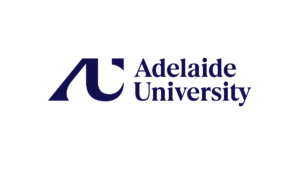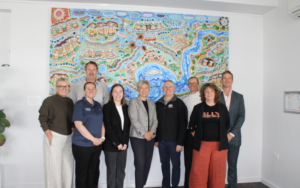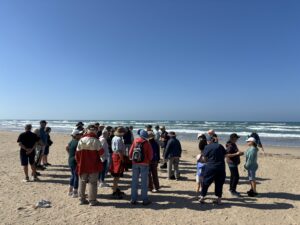
It’s been another exciting year for the Goyder Institute for Water Research. We’ve finalised six major projects and their findings are now being used to support decision-making across the state and beyond. For example, findings from the Coastal Carbon Opportunities, Salt-to-C and Carbon Offsets projects have informed the newly released State Blue Carbon Strategy and advanced blue carbon opportunities for the state.
The Offsetting greenhouse gas emissions through increasing soil organic carbon in SA clay-modified soils project has helped South Australian researchers, farmers and natural resource managers to improve soil fertility and sequester carbon in agricultural soils, contributing to climate change mitigation. Expert advice from the Goyder Institute provided a foundation for future management of water resources in the South-East and restoration of the Coorong. The Sustainable expansion of irrigated agriculture and horticulture in Northern Adelaide Corridor project will help horticultural producers and water managers to sustainably use recycled water to increase production and improve economic returns over the long term.
We’ve also made significant progress on our active projects, with our teams busy finalising the technical outputs.The G-FLOWS project, Finding Long-term Outback Water Solutions, attracted significant media interest after the team found ancient water in the Anangu Pitjantjatjara Yankunytjatjara (APY) Lands. Early indications are that it could not only sustain the community’s ongoing water needs but have significant economic development potential for the region if developed sustainably. The Socio-ecological assessment of the ecosystems, industries and communities of Spencer Gulf project developed a new software platform, Gulfview, to support industry, community and policy-makers obtain the information they need to develop and evaluate proposals for new developments, including aquaculture activities, desalination plants and ports. Through the Ecological connectivity of the River Murray project, water managers will be better able to understand and quickly assess the impact of management decisions on the water quality and ecology of the River Murray.
I congratulate all of our partners and scientists on their collaborative approach and outstanding work throughout the year. Their dedication and commitment has been recognised with the Minister for Environment and Water’s Award for Excellence presented to the Institute at the Water Industry Alliance’s 2019 Smart Water Awards. The CRAFT project team also won the Innovation Award for the new methods and tools they’ve developed to help water planners and policy-makers mitigate the impacts of climate change on water resource systems.
Research Advisory Committee member and ICE WaRM Managing Director Darryl Day was named Water Professional of the Year by the Australian Water Association. Institute researcher Dr Alice Jones (University of Adelaide) was recently awarded the Dean’s Partnership Development Award from the University of Adelaide. Professor Daryle Rigney and Associate Professor Steve Hemming (formerly Flinders University) were invited by the Canadian House of Commons to present a special submission to the Standing Committee on Natural Resources in the area of best practice Indigenous engagement, drawing from several Institute projects including the Translating Ngarrindjeri Yannarumi into water resource risk assessments project.
Following on from recent trips to China, we have continued to build international opportunities during the year with a South Australian Water Trade mission to New Zealand facilitated through the Department for Environment and Water. The trade mission gave us the opportunity to understand water challenges in New Zealand and identify potential future partnerships and collaborations.
2020 will be another big year for the Institute as we finalise all of the projects remaining from our second term and facilitate the uptake of the new knowledge that we have generated into decision-making. We’re also working on a number of new research and knowledge adoption opportunities with our partners, including the ONE Basin CRC bid with the University of Melbourne, the University of Southern Queensland, and the Australian National University. This CRC will help connect communities, industry and researchers to manage climate and water risks in the Murray Darling Basin.
I’ve appreciated your support throughout the year, and I look forward to continuing to build collaborative partnerships to advance South Australia’s water research and management outcomes and capabilities in the coming year.
Our office will be closed from 23 December 2019 until 6 January 2020. I hope you all enjoy a well-deserved festive holiday season and I look forward to seeing you in the new year!
Dr Kane Aldridge
Director
Goyder Institute for Water Research


